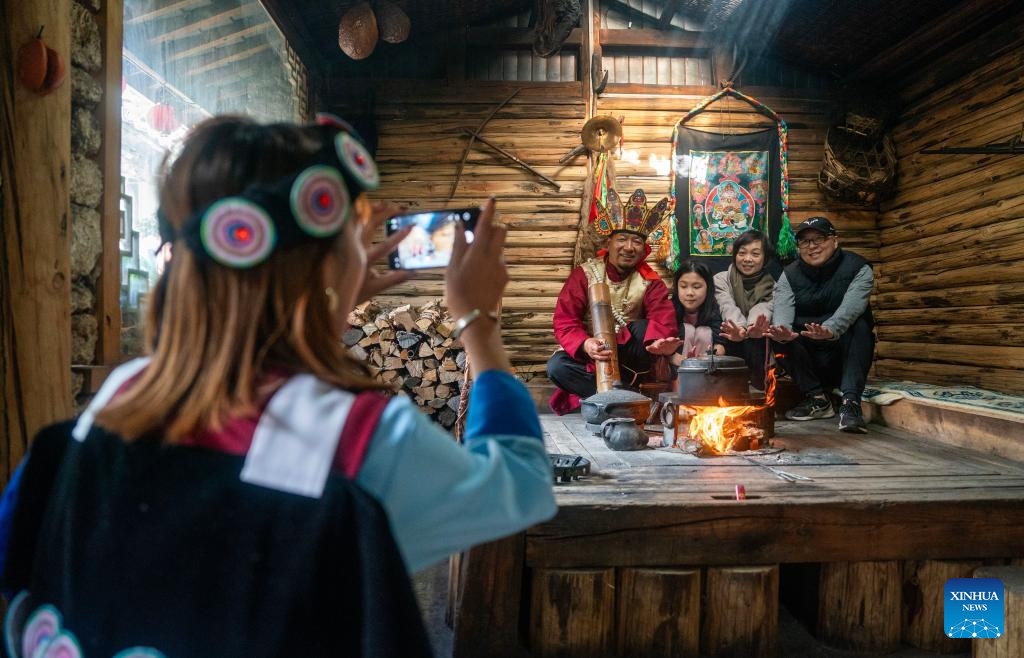
He Yuyue (L) takes photo of her father He Jielin and tourists at home in Yuhu village, Lijiang City, southwest China's Yunnan Province, March 27, 2024. Living in Yuhu village at the foot of the Yulong Snow Mountain, He Jielin has witnessed the changes in this ancient Naxi village.
From the 1980s to 1990s, He Jielin and his wife could only live off the land. Like other villagers, the couple made a living by cutting wood, picking medicinal materials and digging sand, which resulted in great damages to the forest and the environment. However, people in the village remained poor.
In 2004, as the village started to develop tourism, He Jielin began to raise horses and cattle, founded home inns, and gradually, his living condition was improved.
In June 2020, He Jielin renovated his old residence, turning it into the village's first museum on Naxi ethnic culture. Tourists were attracted to his museum to experience various activities related with local culture.
After studying in South Korea, He Jielin's daughter He Yuyue also joined the family business, running the museum together with his father.
"My father knows a lot about the Naxi ethnic culture, which attracted many tourists. I am also learning hard, so that I could spread the culture just like my father," said He Yuyue. Meanwhile, she also shares her daily life on social media in an effort to attract more young visitors.
Currently, the cultural museum of He's family has become a must-see attraction for tourists at Yuhu village. The father and the daughter hope they can earn 300,000 yuan (about 41,452 U.S. dollars) this year. (Xinhua/Chen Xinbo)
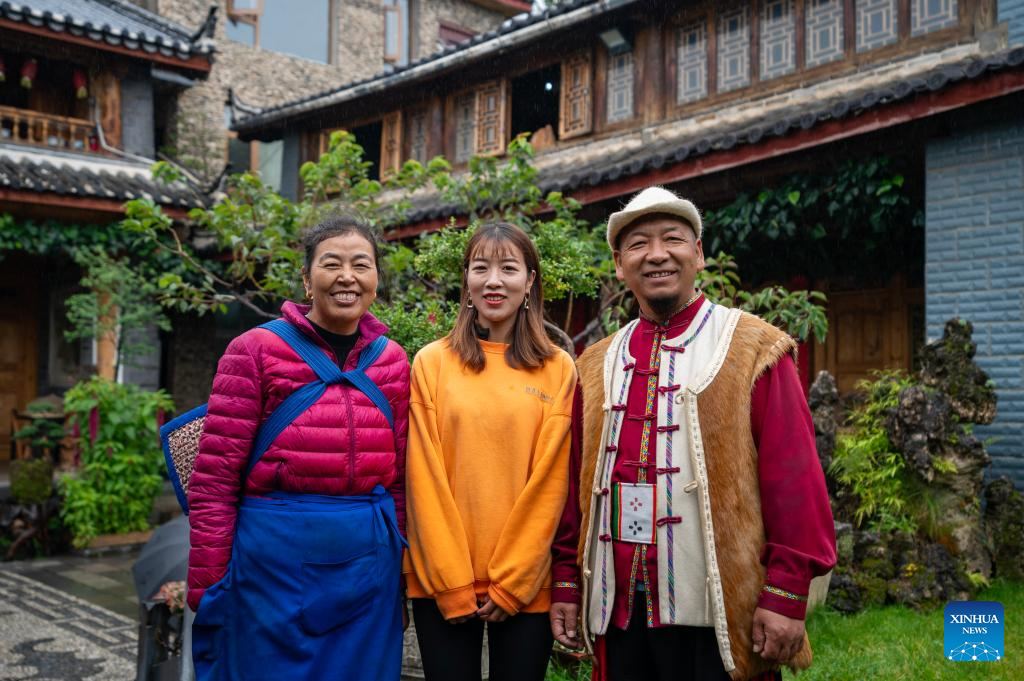
He Jielin (R) poses for photo with his wife (L) and daughter at home in Yuhu village, Lijiang City, southwest China's Yunnan Province, Aug. 28, 2023. Living in Yuhu village at the foot of the Yulong Snow Mountain, He Jielin has witnessed the changes in this ancient Naxi village.
From the 1980s to 1990s, He Jielin and his wife could only live off the land. Like other villagers, the couple made a living by cutting wood, picking medicinal materials and digging sand, which resulted in great damages to the forest and the environment. However, people in the village remained poor.
In 2004, as the village started to develop tourism, He Jielin began to raise horses and cattle, founded home inns, and gradually, his living condition was improved.
In June 2020, He Jielin renovated his old residence, turning it into the village's first museum on Naxi ethnic culture. Tourists were attracted to his museum to experience various activities related with local culture.
After studying in South Korea, He Jielin's daughter He Yuyue also joined the family business, running the museum together with his father.
"My father knows a lot about the Naxi ethnic culture, which attracted many tourists. I am also learning hard, so that I could spread the culture just like my father," said He Yuyue. Meanwhile, she also shares her daily life on social media in an effort to attract more young visitors.
Currently, the cultural museum of He's family has become a must-see attraction for tourists at Yuhu village. The father and the daughter hope they can earn 300,000 yuan (about 41,452 U.S. dollars) this year. (Xinhua/Chen Xinbo)
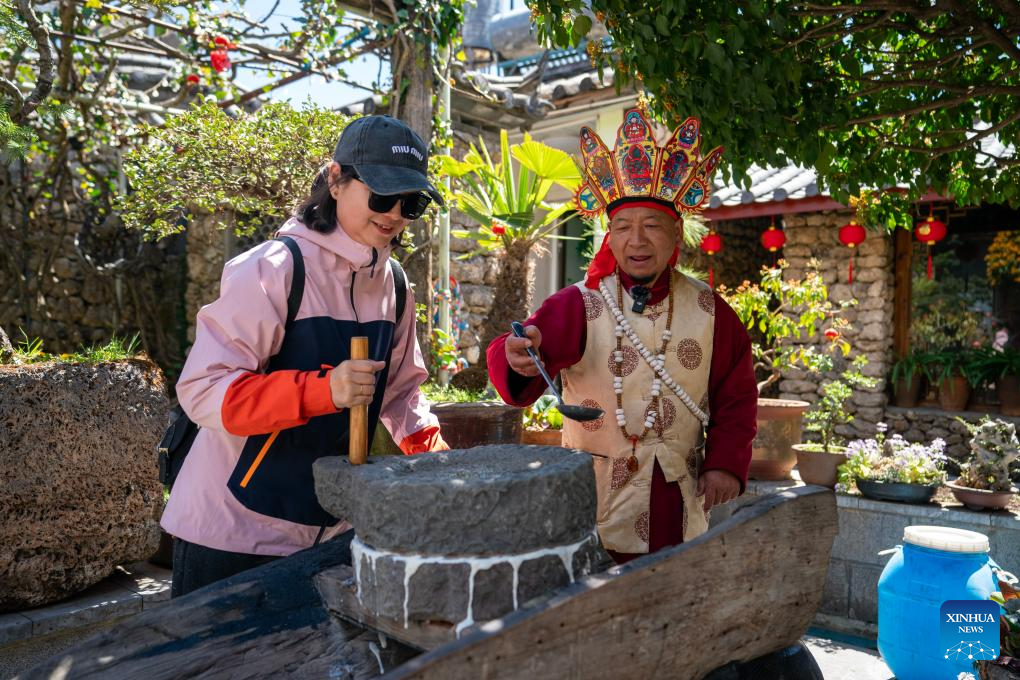
He Jielin (R) shows the traditional skills of making tofu to a tourist at home in Yuhu village, Lijiang City, southwest China's Yunnan Province, March 25, 2024. Living in Yuhu village at the foot of the Yulong Snow Mountain, He Jielin has witnessed the changes in this ancient Naxi village.
From the 1980s to 1990s, He Jielin and his wife could only live off the land. Like other villagers, the couple made a living by cutting wood, picking medicinal materials and digging sand, which resulted in great damages to the forest and the environment. However, people in the village remained poor.
In 2004, as the village started to develop tourism, He Jielin began to raise horses and cattle, founded home inns, and gradually, his living condition was improved.
In June 2020, He Jielin renovated his old residence, turning it into the village's first museum on Naxi ethnic culture. Tourists were attracted to his museum to experience various activities related with local culture.
After studying in South Korea, He Jielin's daughter He Yuyue also joined the family business, running the museum together with his father.
"My father knows a lot about the Naxi ethnic culture, which attracted many tourists. I am also learning hard, so that I could spread the culture just like my father," said He Yuyue. Meanwhile, she also shares her daily life on social media in an effort to attract more young visitors.
Currently, the cultural museum of He's family has become a must-see attraction for tourists at Yuhu village. The father and the daughter hope they can earn 300,000 yuan (about 41,452 U.S. dollars) this year. (Xinhua/Chen Xinbo)
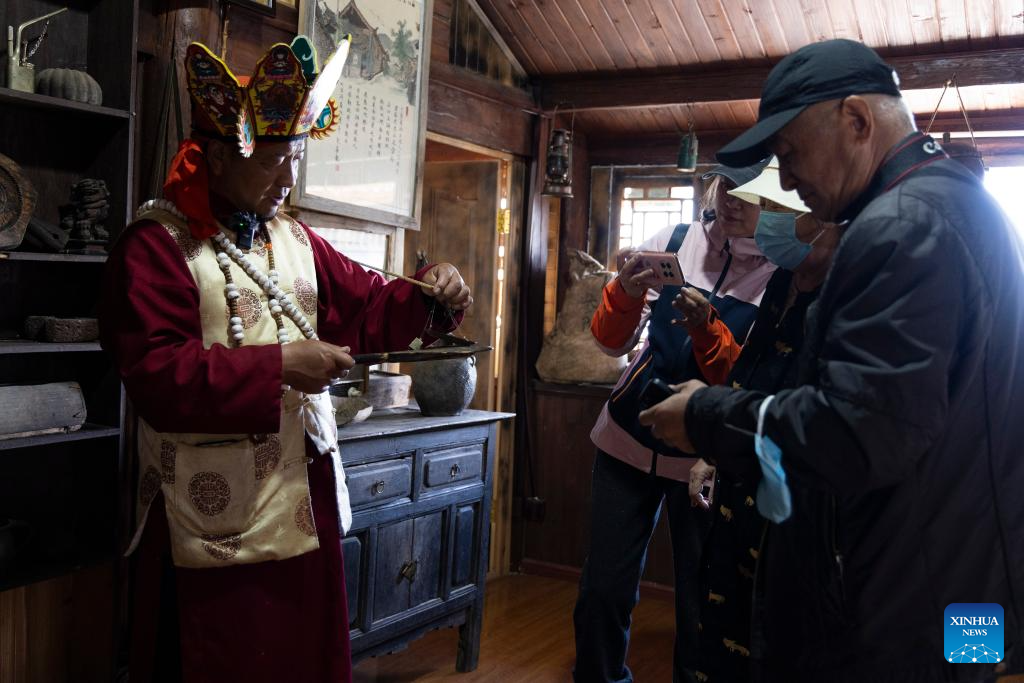
He Jielin (L) introduces old items to tourists at home in Yuhu village, Lijiang City, southwest China's Yunnan Province, March 27, 2024. Living in Yuhu village at the foot of the Yulong Snow Mountain, He Jielin has witnessed the changes in this ancient Naxi village.
From the 1980s to 1990s, He Jielin and his wife could only live off the land. Like other villagers, the couple made a living by cutting wood, picking medicinal materials and digging sand, which resulted in great damages to the forest and the environment. However, people in the village remained poor.
In 2004, as the village started to develop tourism, He Jielin began to raise horses and cattle, founded home inns, and gradually, his living condition was improved.
In June 2020, He Jielin renovated his old residence, turning it into the village's first museum on Naxi ethnic culture. Tourists were attracted to his museum to experience various activities related with local culture.
After studying in South Korea, He Jielin's daughter He Yuyue also joined the family business, running the museum together with his father.
"My father knows a lot about the Naxi ethnic culture, which attracted many tourists. I am also learning hard, so that I could spread the culture just like my father," said He Yuyue. Meanwhile, she also shares her daily life on social media in an effort to attract more young visitors.
Currently, the cultural museum of He's family has become a must-see attraction for tourists at Yuhu village. The father and the daughter hope they can earn 300,000 yuan (about 41,452 U.S. dollars) this year. (Xinhua/Jin Liwang)
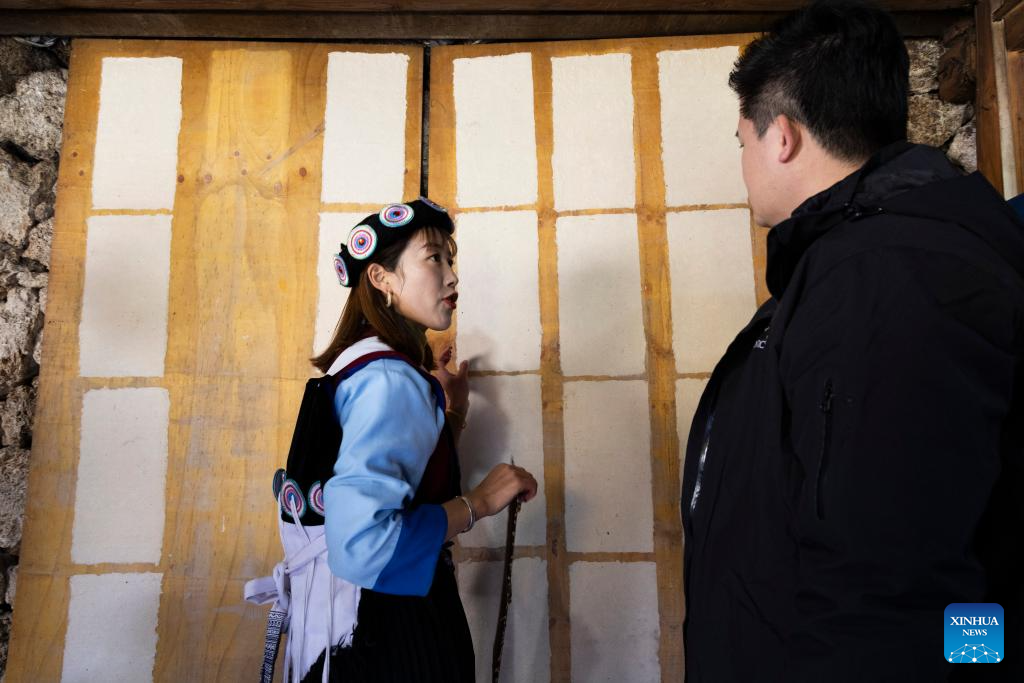
He Yuyue (L) introduces Naxi ethnic group's Dongba paper to a tourist at home in Yuhu village, Lijiang City, southwest China's Yunnan Province, March 27, 2024. Living in Yuhu village at the foot of the Yulong Snow Mountain, He Jielin has witnessed the changes in this ancient Naxi village.
From the 1980s to 1990s, He Jielin and his wife could only live off the land. Like other villagers, the couple made a living by cutting wood, picking medicinal materials and digging sand, which resulted in great damages to the forest and the environment. However, people in the village remained poor.
In 2004, as the village started to develop tourism, He Jielin began to raise horses and cattle, founded home inns, and gradually, his living condition was improved.
In June 2020, He Jielin renovated his old residence, turning it into the village's first museum on Naxi ethnic culture. Tourists were attracted to his museum to experience various activities related with local culture.
After studying in South Korea, He Jielin's daughter He Yuyue also joined the family business, running the museum together with his father.
"My father knows a lot about the Naxi ethnic culture, which attracted many tourists. I am also learning hard, so that I could spread the culture just like my father," said He Yuyue. Meanwhile, she also shares her daily life on social media in an effort to attract more young visitors.
Currently, the cultural museum of He's family has become a must-see attraction for tourists at Yuhu village. The father and the daughter hope they can earn 300,000 yuan (about 41,452 U.S. dollars) this year. (Xinhua/Jin Liwang)
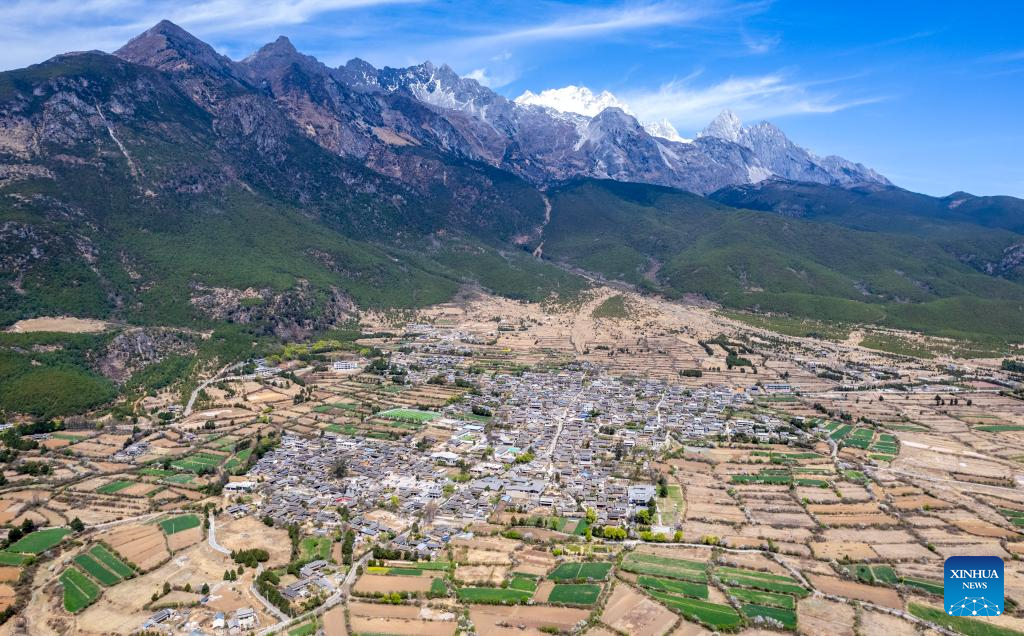
An aerial drone photo taken on March 25, 2024 shows the Yulong Snow Mountain and Yuhu village in Lijiang City, southwest China's Yunnan Province. Living in Yuhu village at the foot of the Yulong Snow Mountain, He Jielin has witnessed the changes in this ancient Naxi village.
From the 1980s to 1990s, He Jielin and his wife could only live off the land. Like other villagers, the couple made a living by cutting wood, picking medicinal materials and digging sand, which resulted in great damages to the forest and the environment. However, people in the village remained poor.
In 2004, as the village started to develop tourism, He Jielin began to raise horses and cattle, founded home inns, and gradually, his living condition was improved.
In June 2020, He Jielin renovated his old residence, turning it into the village's first museum on Naxi ethnic culture. Tourists were attracted to his museum to experience various activities related with local culture.
After studying in South Korea, He Jielin's daughter He Yuyue also joined the family business, running the museum together with his father.
"My father knows a lot about the Naxi ethnic culture, which attracted many tourists. I am also learning hard, so that I could spread the culture just like my father," said He Yuyue. Meanwhile, she also shares her daily life on social media in an effort to attract more young visitors.
Currently, the cultural museum of He's family has become a must-see attraction for tourists at Yuhu village. The father and the daughter hope they can earn 300,000 yuan (about 41,452 U.S. dollars) this year. (Xinhua/Chen Xinbo)
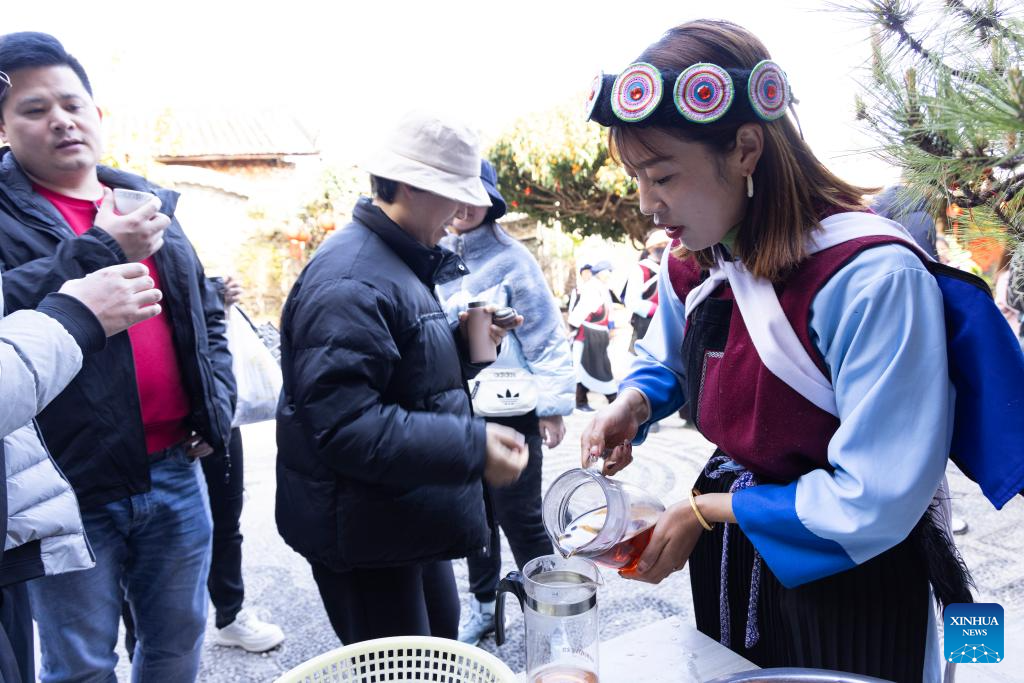
He Yuyue (R) serves tea for tourists at home in Yuhu village, Lijiang City, southwest China's Yunnan Province, March 27, 2024. Living in Yuhu village at the foot of the Yulong Snow Mountain, He Jielin has witnessed the changes in this ancient Naxi village.
From the 1980s to 1990s, He Jielin and his wife could only live off the land. Like other villagers, the couple made a living by cutting wood, picking medicinal materials and digging sand, which resulted in great damages to the forest and the environment. However, people in the village remained poor.
In 2004, as the village started to develop tourism, He Jielin began to raise horses and cattle, founded home inns, and gradually, his living condition was improved.
In June 2020, He Jielin renovated his old residence, turning it into the village's first museum on Naxi ethnic culture. Tourists were attracted to his museum to experience various activities related with local culture.
After studying in South Korea, He Jielin's daughter He Yuyue also joined the family business, running the museum together with his father.
"My father knows a lot about the Naxi ethnic culture, which attracted many tourists. I am also learning hard, so that I could spread the culture just like my father," said He Yuyue. Meanwhile, she also shares her daily life on social media in an effort to attract more young visitors.
Currently, the cultural museum of He's family has become a must-see attraction for tourists at Yuhu village. The father and the daughter hope they can earn 300,000 yuan (about 41,452 U.S. dollars) this year. (Xinhua/Jin Liwang)
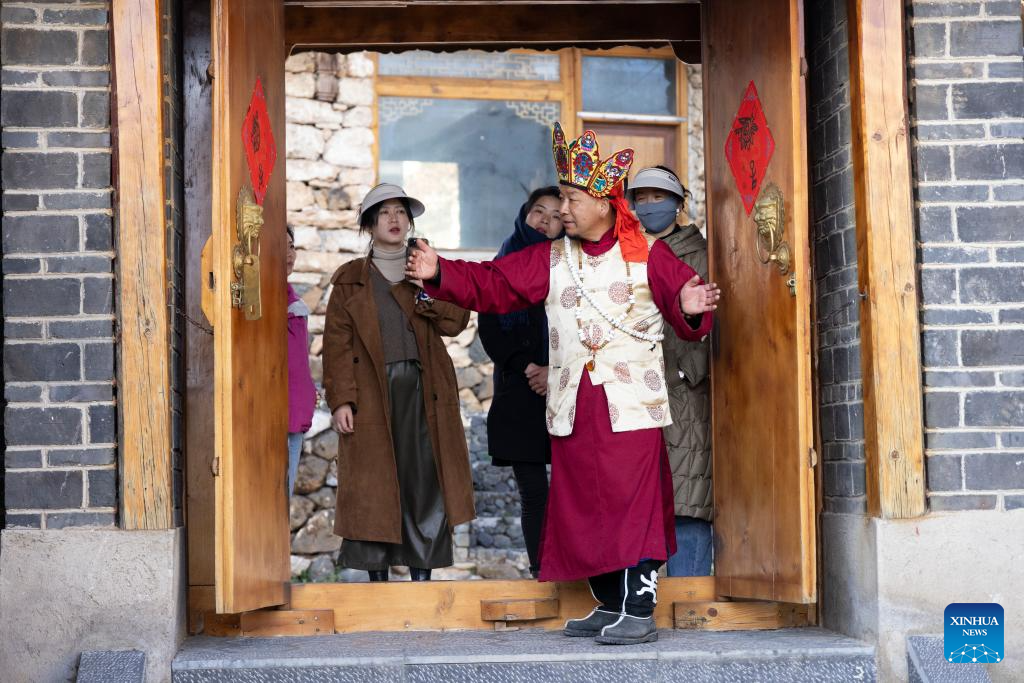
He Jielin (front) shows tourists the layout of his yard in Yuhu village, Lijiang City, southwest China's Yunnan Province, March 27, 2024. Living in Yuhu village at the foot of the Yulong Snow Mountain, He Jielin has witnessed the changes in this ancient Naxi village.
From the 1980s to 1990s, He Jielin and his wife could only live off the land. Like other villagers, the couple made a living by cutting wood, picking medicinal materials and digging sand, which resulted in great damages to the forest and the environment. However, people in the village remained poor.
In 2004, as the village started to develop tourism, He Jielin began to raise horses and cattle, founded home inns, and gradually, his living condition was improved.
In June 2020, He Jielin renovated his old residence, turning it into the village's first museum on Naxi ethnic culture. Tourists were attracted to his museum to experience various activities related with local culture.
After studying in South Korea, He Jielin's daughter He Yuyue also joined the family business, running the museum together with his father.
"My father knows a lot about the Naxi ethnic culture, which attracted many tourists. I am also learning hard, so that I could spread the culture just like my father," said He Yuyue. Meanwhile, she also shares her daily life on social media in an effort to attract more young visitors.
Currently, the cultural museum of He's family has become a must-see attraction for tourists at Yuhu village. The father and the daughter hope they can earn 300,000 yuan (about 41,452 U.S. dollars) this year. (Xinhua/Jin Liwang)
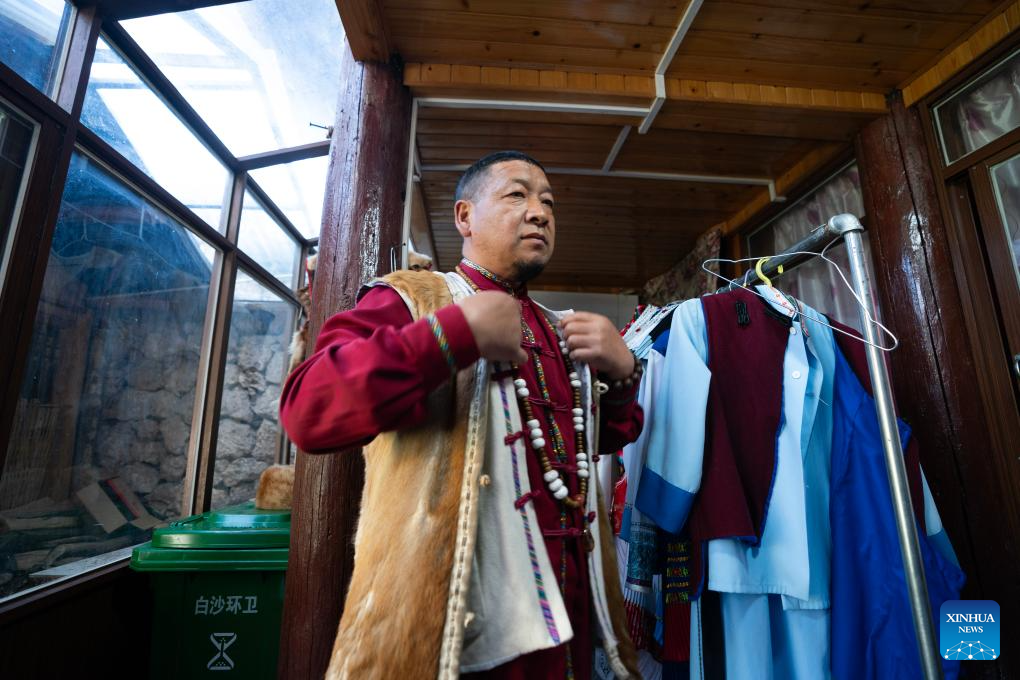
He Jielin puts on traditional costumes of Naxi ethnic group at home in Yuhu village, Lijiang City, southwest China's Yunnan Province, March 25, 2024. Living in Yuhu village at the foot of the Yulong Snow Mountain, He Jielin has witnessed the changes in this ancient Naxi village.
From the 1980s to 1990s, He Jielin and his wife could only live off the land. Like other villagers, the couple made a living by cutting wood, picking medicinal materials and digging sand, which resulted in great damages to the forest and the environment. However, people in the village remained poor.
In 2004, as the village started to develop tourism, He Jielin began to raise horses and cattle, founded home inns, and gradually, his living condition was improved.
In June 2020, He Jielin renovated his old residence, turning it into the village's first museum on Naxi ethnic culture. Tourists were attracted to his museum to experience various activities related with local culture.
After studying in South Korea, He Jielin's daughter He Yuyue also joined the family business, running the museum together with his father.
"My father knows a lot about the Naxi ethnic culture, which attracted many tourists. I am also learning hard, so that I could spread the culture just like my father," said He Yuyue. Meanwhile, she also shares her daily life on social media in an effort to attract more young visitors.
Currently, the cultural museum of He's family has become a must-see attraction for tourists at Yuhu village. The father and the daughter hope they can earn 300,000 yuan (about 41,452 U.S. dollars) this year. (Xinhua/Chen Xinbo)

He Jielin writes in Dongba pictograph at home in Yuhu village, Lijiang City, southwest China's Yunnan Province, March 25, 2024. Living in Yuhu village at the foot of the Yulong Snow Mountain, He Jielin has witnessed the changes in this ancient Naxi village.
From the 1980s to 1990s, He Jielin and his wife could only live off the land. Like other villagers, the couple made a living by cutting wood, picking medicinal materials and digging sand, which resulted in great damages to the forest and the environment. However, people in the village remained poor.
In 2004, as the village started to develop tourism, He Jielin began to raise horses and cattle, founded home inns, and gradually, his living condition was improved.
In June 2020, He Jielin renovated his old residence, turning it into the village's first museum on Naxi ethnic culture. Tourists were attracted to his museum to experience various activities related with local culture.
After studying in South Korea, He Jielin's daughter He Yuyue also joined the family business, running the museum together with his father.
"My father knows a lot about the Naxi ethnic culture, which attracted many tourists. I am also learning hard, so that I could spread the culture just like my father," said He Yuyue. Meanwhile, she also shares her daily life on social media in an effort to attract more young visitors.
Currently, the cultural museum of He's family has become a must-see attraction for tourists at Yuhu village. The father and the daughter hope they can earn 300,000 yuan (about 41,452 U.S. dollars) this year. (Xinhua/Chen Xinbo)
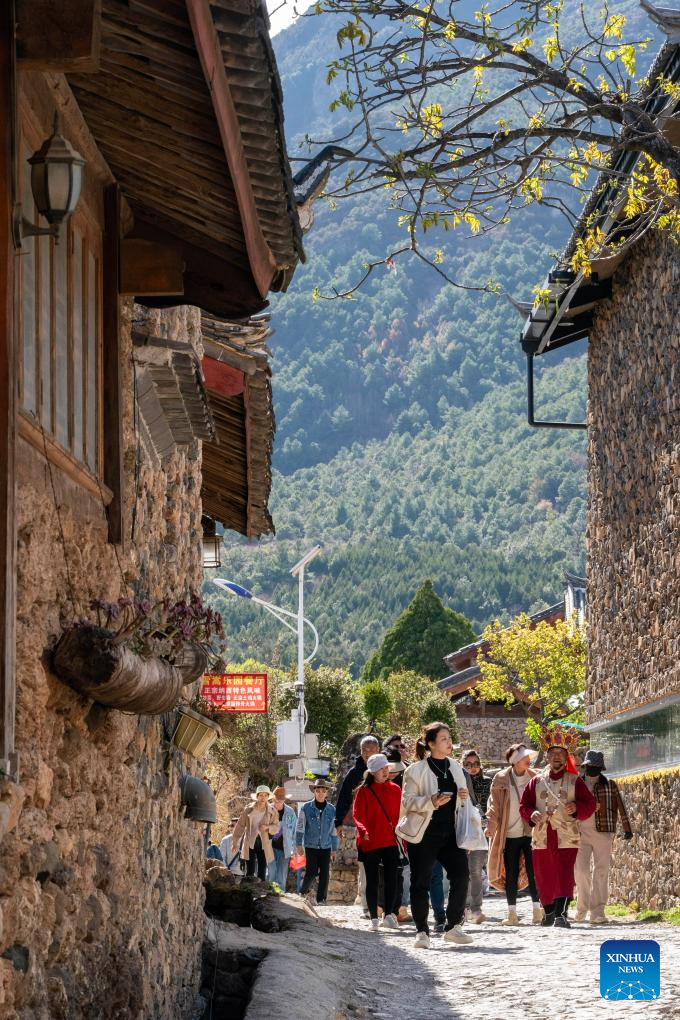
He Jielin (2nd R) guides tourists around Yuhu village, Lijiang City, southwest China's Yunnan Province, March 27, 2024. Living in Yuhu village at the foot of the Yulong Snow Mountain, He Jielin has witnessed the changes in this ancient Naxi village.
From the 1980s to 1990s, He Jielin and his wife could only live off the land. Like other villagers, the couple made a living by cutting wood, picking medicinal materials and digging sand, which resulted in great damages to the forest and the environment. However, people in the village remained poor.
In 2004, as the village started to develop tourism, He Jielin began to raise horses and cattle, founded home inns, and gradually, his living condition was improved.
In June 2020, He Jielin renovated his old residence, turning it into the village's first museum on Naxi ethnic culture. Tourists were attracted to his museum to experience various activities related with local culture.
After studying in South Korea, He Jielin's daughter He Yuyue also joined the family business, running the museum together with his father.
"My father knows a lot about the Naxi ethnic culture, which attracted many tourists. I am also learning hard, so that I could spread the culture just like my father," said He Yuyue. Meanwhile, she also shares her daily life on social media in an effort to attract more young visitors.
Currently, the cultural museum of He's family has become a must-see attraction for tourists at Yuhu village. The father and the daughter hope they can earn 300,000 yuan (about 41,452 U.S. dollars) this year. (Xinhua/Chen Xinbo)
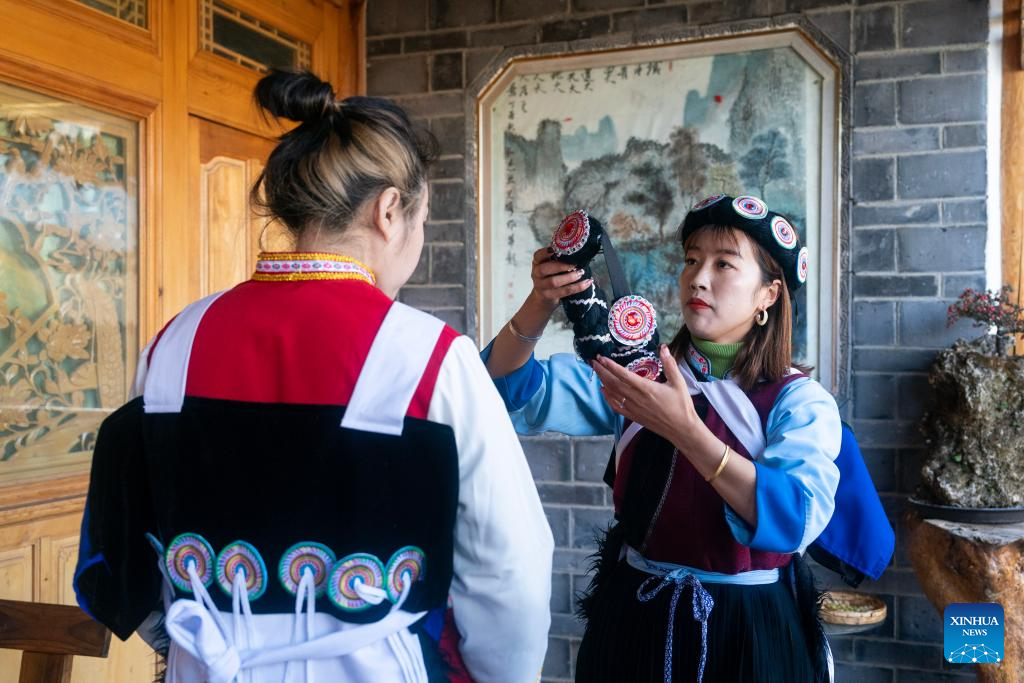
He Yuyue (R) helps a tourist put on traditional costume of Naxi ethnic group at home in Yuhu village, Lijiang City, southwest China's Yunnan Province, March 27, 2024. Living in Yuhu village at the foot of the Yulong Snow Mountain, He Jielin has witnessed the changes in this ancient Naxi village.
From the 1980s to 1990s, He Jielin and his wife could only live off the land. Like other villagers, the couple made a living by cutting wood, picking medicinal materials and digging sand, which resulted in great damages to the forest and the environment. However, people in the village remained poor.
In 2004, as the village started to develop tourism, He Jielin began to raise horses and cattle, founded home inns, and gradually, his living condition was improved.
In June 2020, He Jielin renovated his old residence, turning it into the village's first museum on Naxi ethnic culture. Tourists were attracted to his museum to experience various activities related with local culture.
After studying in South Korea, He Jielin's daughter He Yuyue also joined the family business, running the museum together with his father.
"My father knows a lot about the Naxi ethnic culture, which attracted many tourists. I am also learning hard, so that I could spread the culture just like my father," said He Yuyue. Meanwhile, she also shares her daily life on social media in an effort to attract more young visitors.
Currently, the cultural museum of He's family has become a must-see attraction for tourists at Yuhu village. The father and the daughter hope they can earn 300,000 yuan (about 41,452 U.S. dollars) this year. (Xinhua/Chen Xinbo)
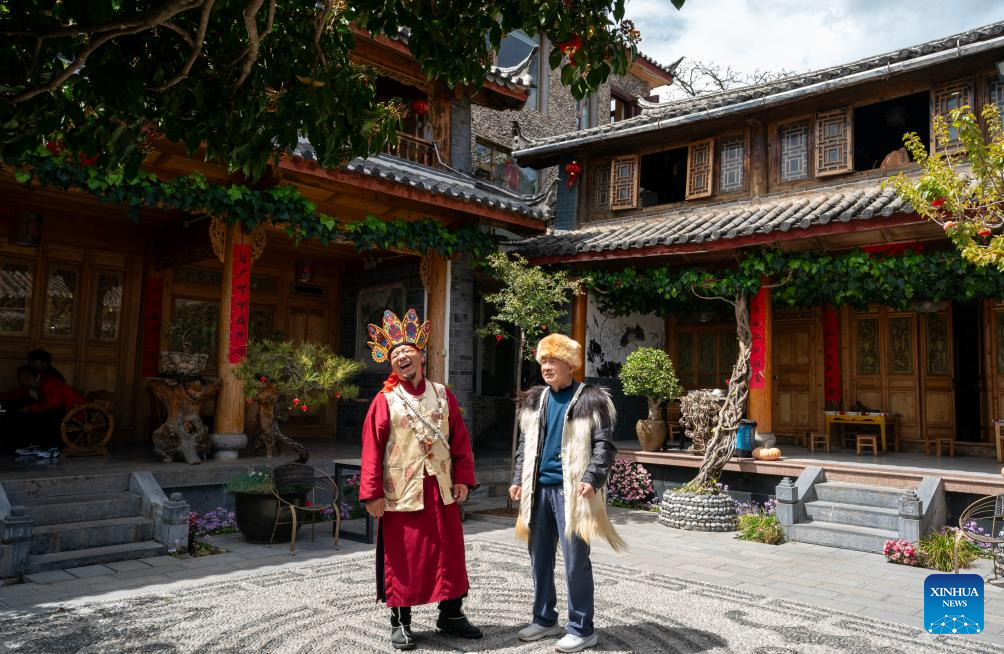
He Jielin (L) talks with a tourist wearing costumes of Naxi ethnic group in Yuhu village, Lijiang City, southwest China's Yunnan Province, March 25, 2024. Living in Yuhu village at the foot of the Yulong Snow Mountain, He Jielin has witnessed the changes in this ancient Naxi village.
From the 1980s to 1990s, He Jielin and his wife could only live off the land. Like other villagers, the couple made a living by cutting wood, picking medicinal materials and digging sand, which resulted in great damages to the forest and the environment. However, people in the village remained poor.
In 2004, as the village started to develop tourism, He Jielin began to raise horses and cattle, founded home inns, and gradually, his living condition was improved.
In June 2020, He Jielin renovated his old residence, turning it into the village's first museum on Naxi ethnic culture. Tourists were attracted to his museum to experience various activities related with local culture.
After studying in South Korea, He Jielin's daughter He Yuyue also joined the family business, running the museum together with his father.
"My father knows a lot about the Naxi ethnic culture, which attracted many tourists. I am also learning hard, so that I could spread the culture just like my father," said He Yuyue. Meanwhile, she also shares her daily life on social media in an effort to attract more young visitors.
Currently, the cultural museum of He's family has become a must-see attraction for tourists at Yuhu village. The father and the daughter hope they can earn 300,000 yuan (about 41,452 U.S. dollars) this year. (Xinhua/Chen Xinbo)
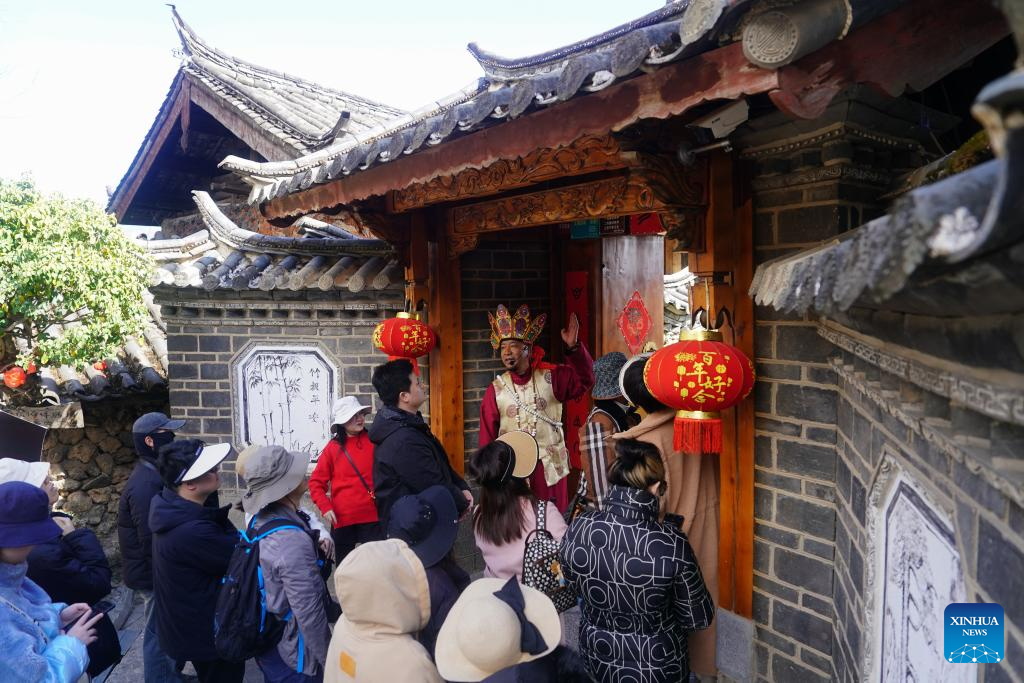
He Jielin guides tourists to his home in Yuhu village, Lijiang City, southwest China's Yunnan Province, March 27, 2024. Living in Yuhu village at the foot of the Yulong Snow Mountain, He Jielin has witnessed the changes in this ancient Naxi village.
From the 1980s to 1990s, He Jielin and his wife could only live off the land. Like other villagers, the couple made a living by cutting wood, picking medicinal materials and digging sand, which resulted in great damages to the forest and the environment. However, people in the village remained poor.
In 2004, as the village started to develop tourism, He Jielin began to raise horses and cattle, founded home inns, and gradually, his living condition was improved.
In June 2020, He Jielin renovated his old residence, turning it into the village's first museum on Naxi ethnic culture. Tourists were attracted to his museum to experience various activities related with local culture.
After studying in South Korea, He Jielin's daughter He Yuyue also joined the family business, running the museum together with his father.
"My father knows a lot about the Naxi ethnic culture, which attracted many tourists. I am also learning hard, so that I could spread the culture just like my father," said He Yuyue. Meanwhile, she also shares her daily life on social media in an effort to attract more young visitors.
Currently, the cultural museum of He's family has become a must-see attraction for tourists at Yuhu village. The father and the daughter hope they can earn 300,000 yuan (about 41,452 U.S. dollars) this year. (Xinhua/Chen Xinbo)
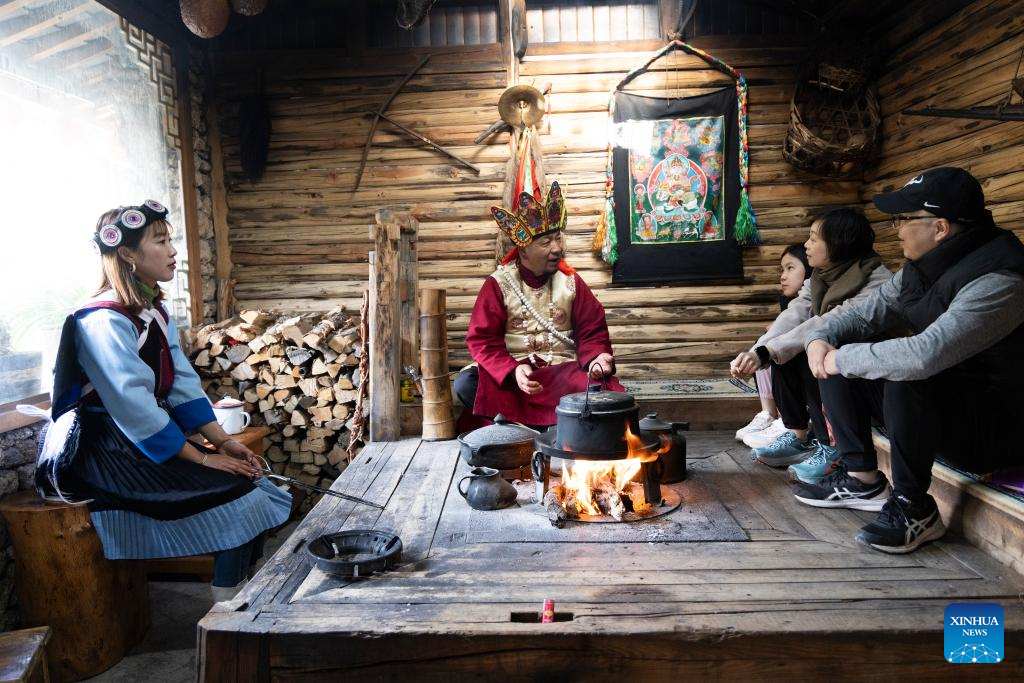
He Jielin (2nd L), and his daughter He Yuyue (1st L) introduce Naxi ethnic culture to tourists at home in Yuhu village, Lijiang City, southwest China's Yunnan Province, March 27, 2024. Living in Yuhu village at the foot of the Yulong Snow Mountain, He Jielin has witnessed the changes in this ancient Naxi village.
From the 1980s to 1990s, He Jielin and his wife could only live off the land. Like other villagers, the couple made a living by cutting wood, picking medicinal materials and digging sand, which resulted in great damages to the forest and the environment. However, people in the village remained poor.
In 2004, as the village started to develop tourism, He Jielin began to raise horses and cattle, founded home inns, and gradually, his living condition was improved.
In June 2020, He Jielin renovated his old residence, turning it into the village's first museum on Naxi ethnic culture. Tourists were attracted to his museum to experience various activities related with local culture.
After studying in South Korea, He Jielin's daughter He Yuyue also joined the family business, running the museum together with his father.
"My father knows a lot about the Naxi ethnic culture, which attracted many tourists. I am also learning hard, so that I could spread the culture just like my father," said He Yuyue. Meanwhile, she also shares her daily life on social media in an effort to attract more young visitors.
Currently, the cultural museum of He's family has become a must-see attraction for tourists at Yuhu village. The father and the daughter hope they can earn 300,000 yuan (about 41,452 U.S. dollars) this year. (Xinhua/Jin Liwang)
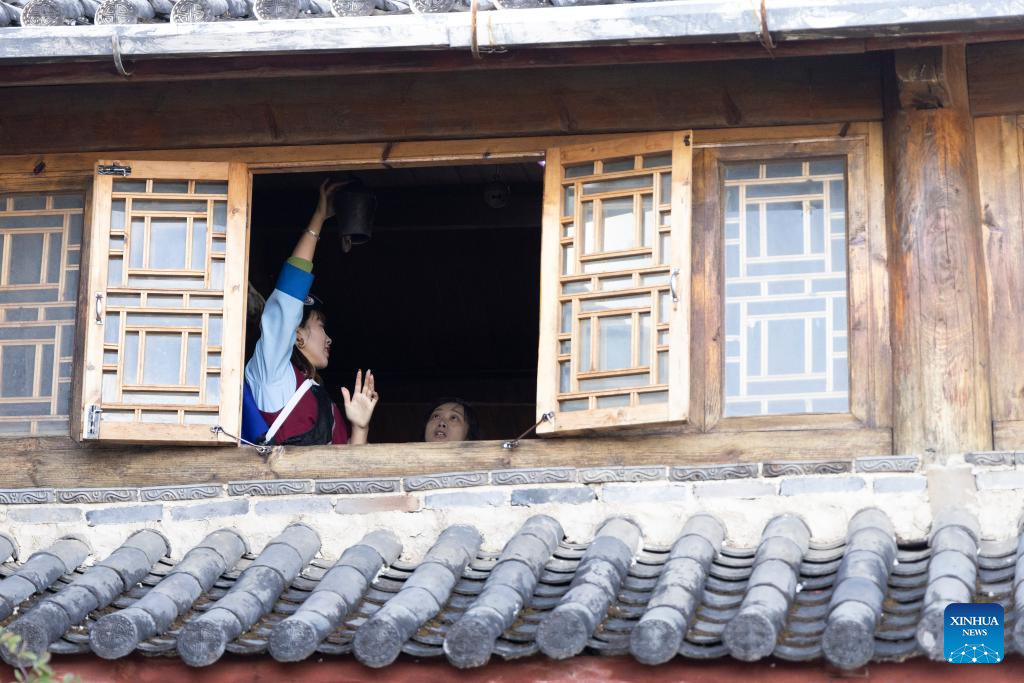
He Yuyue (L) introduces old items to a tourist at home in Yuhu village, Lijiang City, southwest China's Yunnan Province, March 27, 2024. Living in Yuhu village at the foot of the Yulong Snow Mountain, He Jielin has witnessed the changes in this ancient Naxi village.
From the 1980s to 1990s, He Jielin and his wife could only live off the land. Like other villagers, the couple made a living by cutting wood, picking medicinal materials and digging sand, which resulted in great damages to the forest and the environment. However, people in the village remained poor.
In 2004, as the village started to develop tourism, He Jielin began to raise horses and cattle, founded home inns, and gradually, his living condition was improved.
In June 2020, He Jielin renovated his old residence, turning it into the village's first museum on Naxi ethnic culture. Tourists were attracted to his museum to experience various activities related with local culture.
After studying in South Korea, He Jielin's daughter He Yuyue also joined the family business, running the museum together with his father.
"My father knows a lot about the Naxi ethnic culture, which attracted many tourists. I am also learning hard, so that I could spread the culture just like my father," said He Yuyue. Meanwhile, she also shares her daily life on social media in an effort to attract more young visitors.
Currently, the cultural museum of He's family has become a must-see attraction for tourists at Yuhu village. The father and the daughter hope they can earn 300,000 yuan (about 41,452 U.S. dollars) this year. (Xinhua/Jin Liwang)